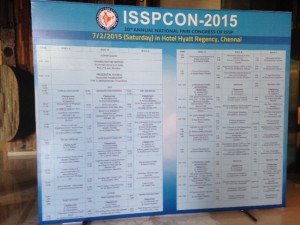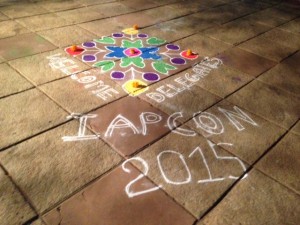
So, another year and another trip to India. During the last three years I have travelled to various cities of India to attend the yearly conferences of the Indian Society for the Study of Pain (ISSP) and the Indian Association of Palliative Care (IAPC) in order to collect data for my social science doctorate, looking at how pain management is practised in the country.
I am a consultant anaesthetist in the British NHS, studying part-time for a PhD under the supervision of David Clark and Sandy Whitelaw, at the School of Interdisicplinary Studies, University of Glasgow, Dumfries Campus.
In February 2015, my travels took me to the southern cities of Chennai and Hyderabad and again, I had a wonderful experience, receiving the most generous hospitality.
Would my plans work?
As previously reported on this blog, I collected the bulk of my interview data in 2014. This year the main aim was to distribute questionnaires to conference delegates, as well as to record a further handful of selected interviews.
As an ‘old-timer’ I felt much more relaxed than I had on previous trips but I was still anxious about whether my plans would prove to be successful.
Would people fill in the questionnaires during a busy conference. Would the questions be appropriate? How many copies would I need? Would I even be able to print enough questionnaires in India and carry them back to the UK within my luggage limit?
To the Indian Society for the Study of Pain conference
Arriving in the busy city of Chennai, a few days before the start of the ISSP conference, I was aware of how much at home I felt. The heat, the smells, the food, the noise – what once felt very alien was becoming increasingly familiar. The topics of my jottings and field notes were evolving to reflect this.
My first task, however, was one that I had not attempted before – photocopying 500 copies of my carefully constructed questionnaire. Despite several of my UK colleagues cheerfully assuring me that, ‘Every other shop would do xerox’, it took several hours of street wandering before I managed to focus my attention enough to spot a suitable vendor. But all was well in the end and for a very reasonable price I haggled a deal to pick up the order in under 24 hours.
On the first day of the conference, having been generously granted permission by the ISSP to distribute my questionnaires to delegates, I positioned myself strategically by the only entrance into the venue.
A responsibility
Awkwardness at attempting to stop and speak to every delegate, asking for their valuable time, I ended up enjoying the work – meeting everyone who was attending, many of whom were friends and acquaintances from before. The day was exhausting, as I repeatedly explained my work in the most succinct way I could. But it was great to have the opportunity to connect with so many people.
Initially I had hoped to put the questionnaire into the delegates’ conference bags but I think there was a real advantage to speaking to everyone individually. Several delegates had been interview participants from the year before and were keen to ask how the research was progressing. I became acutely aware of the responsibility I have to feedback the findings to so many who have generously given their time and knowledge.
It is all too easy to get blinkered by the process of writing a PhD and forget what prompted the creation of the project itself.
The ISSP conference was attended by approximately 250 people, and although there were some speakers from overseas, the vast majority of delegates were practising clinicians in India.
Acute pain management
As on previous occasions, there was a strong focus on interventional techniques, complimented by pre-conference workshops teaching some of these practical procedures. For me, however, one of the highlights of the conference was a talk on Acute Pain Services by Professor PN Jain from the renowned Tata Memorial Hospital, Mumbai. He spoke eloquently of his pioneering work in the hospital which has focused on acute pain management (i.e. treating pain that is short-lived, such as that following surgery or trauma). It was interesting to see a topic that often receives less publicity than, for example pain related to terminal cancer, getting a headline billing as the ‘Hansraj Nayyer Oration’ plenary session. Professor Jain also spoke of some preliminary findings of a survey related to the provision of acute pain services in India. The results of this work are yet to be published but I look forward to reading these in the near future.
The final slot of the entire conference particularly caught my attention. The discussion here focused on multidisciplinary pain management, and specifically what this should or could translate to in the Indian context.
Indian Association of Palliative Care conference
The second leg of my trip was to the IAPC conference in Hyderabad. The contrast between the two meetings was, as I have noted on previous trips, quite striking.
The IAPC conference was considerably larger with over 600 registrations and a big overseas presence (140 delegates). International bodies such as Human Rights Watch (HRW) and the International Association of Hospice and Palliative Care were prominently represented by Diederik Lohman and Liliana de Lima respectively.
Again, I distributed my questionnaires to as many delegates as I could, attempting to engage as many as possible with my research. And again I was very encouraged by the level of support I received.
Inspirational speakers
The three-day programme of the conference itself was very varied with some truly inspiring speakers, but I was particularly interested in a session on the final day called ‘Sharing of significant developments in India – 2014’. A very clear lecture by Dr R K Mani described the recently published position statement on end of life care from the IAPC and the Indian Society of Critical Care Medicine.
Equally engaging was a description of a pain prevalence study (supported by several organisations including HRW) by Dr Vidya Kumaraswamy. The final data of this work is yet to be published. Of note I also attended a small group discussion called ‘Meet the Expert: Pain Policy’ with Dr Jim Cleary and Dr Sushma Bhatnagar. This was a very interactive session with plenty of chances to ask questions. I was again, interested to see some dialogue around access to treatment for acute pain as well as that related to terminal cancer.
A successful trip
Overall I feel my 2015 trip was a success, not least in the collection of new data for my study. I am extremely grateful to all the research participants who gave me their time, and to the conference organisers and the ISSP and IAPC without whom this work would not be possible.
Both meetings demonstrated not only recent advances in pain management in India but also described exciting developments for the future which I hope to see published soon.
I also received such generous hospitality throughout my stay – which of course included magnificent evening entertainments at each of the conferences – with unforgettable music, dancing and culinary delights.
Incredible dedication
While I was in India, as well as attending the conferences, I was kindly offered the chance to visit two institutions – the highly regarded Christian Medical College in Vellore, and the newly formed Sanjeevan Palliative Care Program in Pondicherry. I witnessed incredible dedication from clinical staff and it was their encounters with patients, that are most strongly inscribed in my memory.
Now that I am back at my computer in the UK, diligently entering data into spreadsheets and transcribing interviews, it is these stories that I am mindful of recalling. I am conscious that so many of my insights relating to India are formed from a vantage point that few have the opportunity to adopt and I am profoundly aware and grateful for this privileged access that I have been granted.
Clare Roques



